If you have an upset stomach or painful symptoms after eating certain foods, you may have a condition called gastritis.
About 8 out of every 1,000 people experience acute (sudden) gastritis, and 2 out of 10,000 people have a chronic form of the condition.
An infection caused by the bacteria H. pylori causes most cases of gastritis, but symptoms can worsen based on the foods you eat.
Understanding how your favorite foods may affect your gastritis can help you choose items that will minimize your symptoms rather than cause them to flare up.
Discover how almond milk may affect gastritis, whether you should keep drinking it (or make the switch if you typically drink cow’s milk), and how to pick the best option for gastritis symptoms.
Quick Answer
Is almond milk good for gastritis?
Yes, almond milk is good for gastritis because it's low in fat, has low acidity, contains plant-based proteins, and is anti-inflammatory.
What is Gastritis?
Gastritis is a common condition that refers to inflammation in your stomach lining.
You may suffer from acute gastritis caused by eating spicy food or drinking alcohol in excess.
However, some people also suffer from chronic gastritis in which the stomach lining is persistently red and swollen.
Gastritis can also be caused by spicy foods or alcohol, as well as:
- Extreme, chronic stress
- Smoking
- Excessive or long-term use of NSAIDs like ibuprofen and aspirin
- Infections (90% of cases are caused by H. pylori bacteria)
- Traumatic injury
- Major surgery
- Autoimmune conditions
- Pernicious anemia (when your stomach can’t digest Vitamin B12)
- Chronic bile reflux
Check out this video from Dr. Aishwarya Kelkar for more information about what causes gastritis.
Symptoms of Gastritis
Common symptoms of gastritis include:
- Hiccups or belching
- Upset stomach or stomach pain
- Abdominal bleeding
- Nausea and vomiting
- Loss of appetite
- Constant feeling of fullness
- Burning in your stomach
- Blood in your stool or vomit (may indicate internal bleeding)
Foods To Avoid If You Have Gastritis
While your diet doesn’t cause gastritis, some foods can worsen pain and discomfort. A poor diet and gastritis can eventually cause a stomach ulcer if left untreated.
Avoiding the following foods can help lessen your symptoms of gastritis:
- Spicy foods
- Fried items
- Fatty foods
- Highly acidic foods like fruits, some dairy, coffee, processed foods, carbonated beverages, meat, and foods with high animal protein content.
In some cases, food allergies can cause eosinophilic gastroenteritis, a rare form of the condition.
If you are allergic to any type of food, avoiding it can help you prevent gastritis symptoms.
Is Almond Milk Good For Gastritis?
Organic and additive-free almond milk brands are ideal for people living with gastritis symptoms.
In fact, almond milk can be great for your overall gut health (if you drink the right kind).
Almond milk is plant-based; it doesn’t contain animal fats or proteins. It is low fat and has a neutral pH, which helps soothe and calm inflamed stomach lining during a gastritis flare-up.
Low in Saturated Fat
Diets high in fat, carbohydrates, and cholesterol are associated with increased gastritis symptoms.
Almond milk is low in cholesterol, carbohydrates, and saturated fat, making it an excellent option for people with gastritis.
For example, one cup of Three Trees Unsweetened Almond Milk has only 1 gram of saturated fat, 3 grams of carbohydrates, and 0 mg of cholesterol.
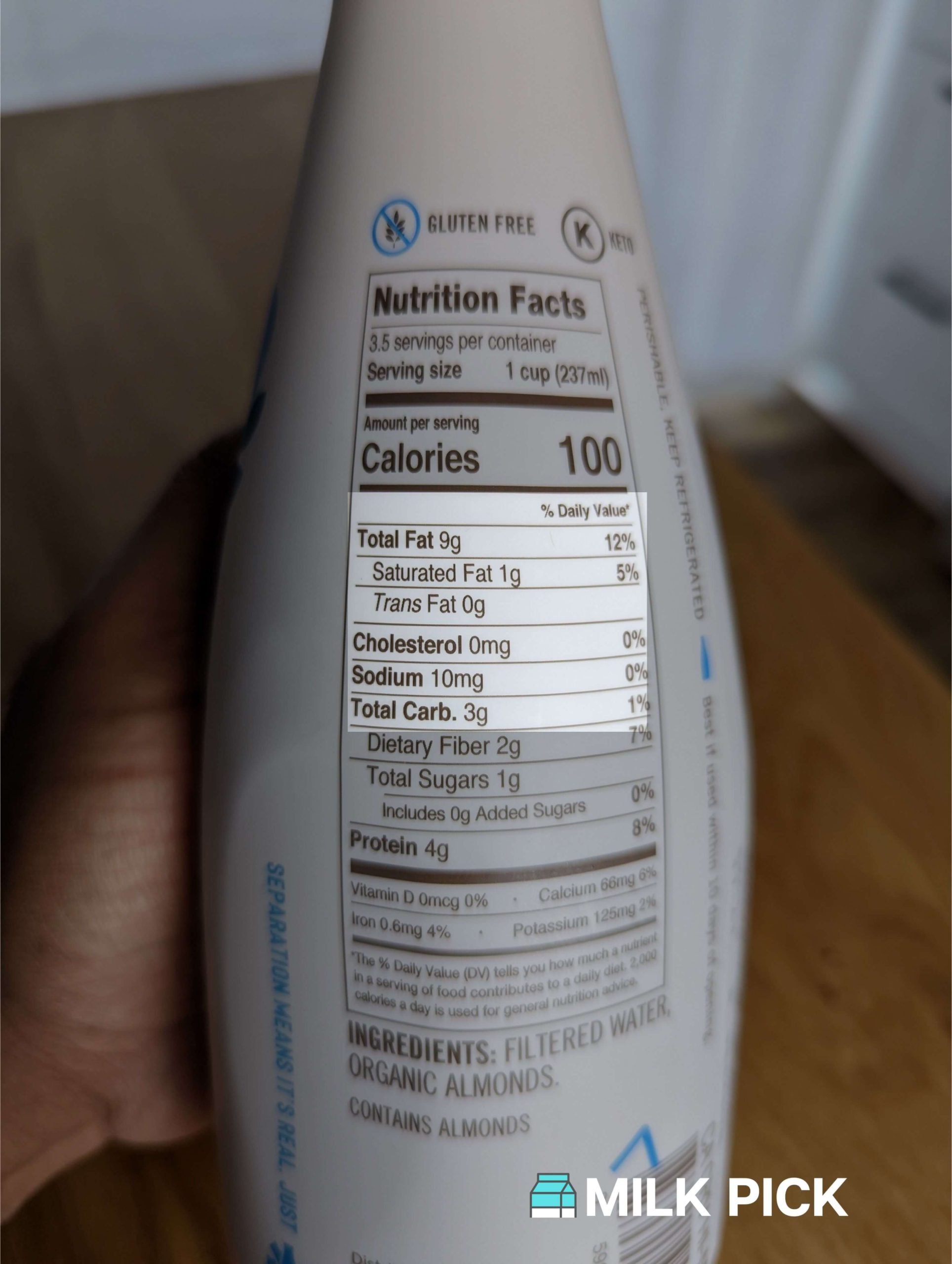
Additive-free almond milk like this one can help people with gastritis maintain a healthy diet low in macronutrients that can cause gastritis symptoms to worsen.
Contains Plant-Based Proteins
Animal-based proteins can worsen gastritis symptoms.
If you have gastritis, drinking cow’s milk can irritate your digestive tract and may even increase your risk for gastric cancer.
This makes finding an alternative to cow milk vital to your health and well-being.
Almond milk is an ideal substitution for cow milk for people with gastritis because it is 100% plant-based.
Almonds grow on the Prunus dulcis tree and contain several beneficial nutrients, including protein.
When you drink natural almond milk, you get between 3 and 5 grams of plant-based protein that your body can use to build muscle and support other critical body functions.
As a general rule of thumb, almond milk brands that contain more almonds tend to have more protein than ones made primarily of water, emulsifiers, and additives.
For instance, Elmhurst's almond milk contains 5g of protein.
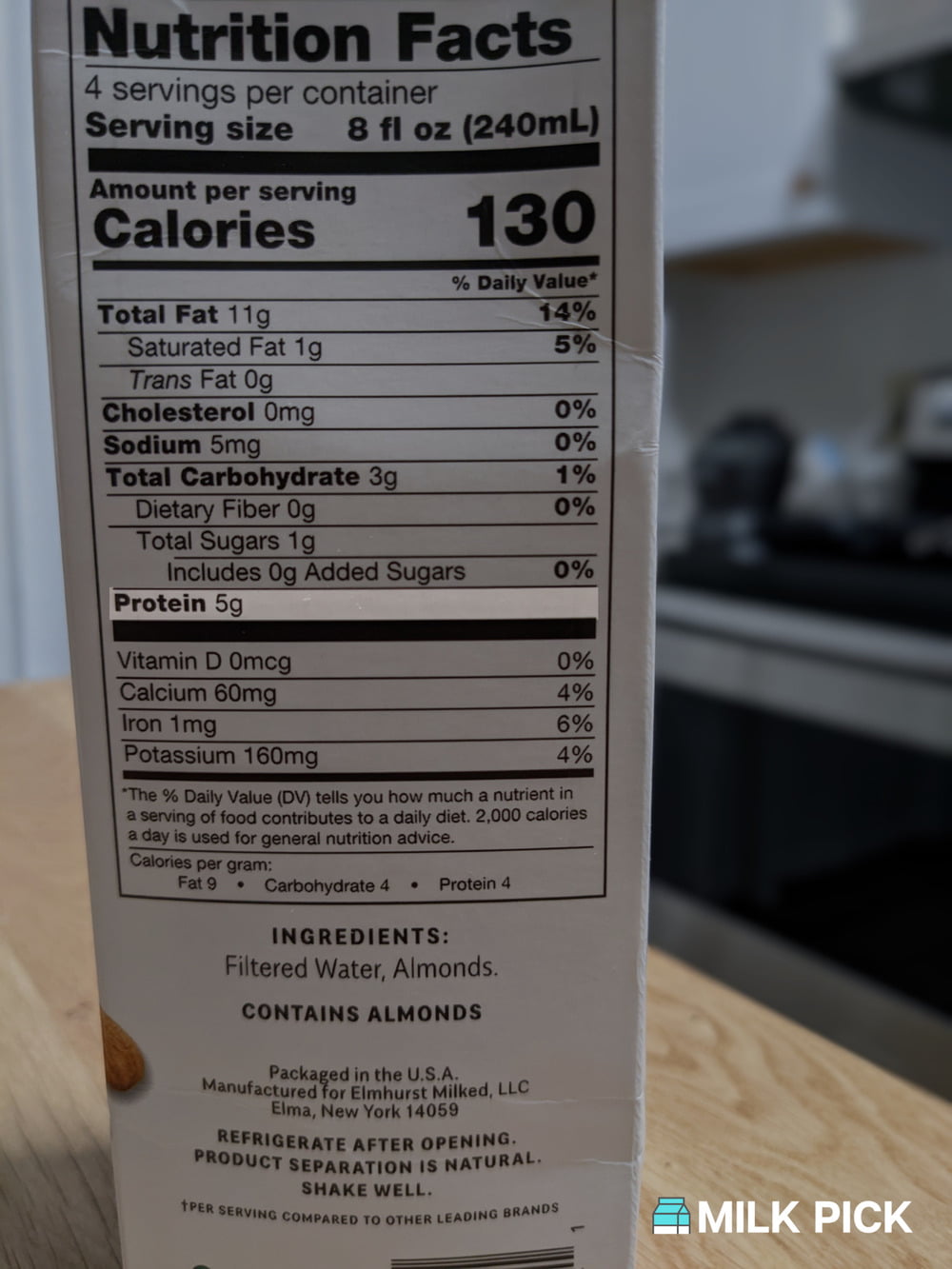
Nature's Promise, on the other hand, only has 1g of protein. It also contains a ton of added ingredients and likely very few almonds.
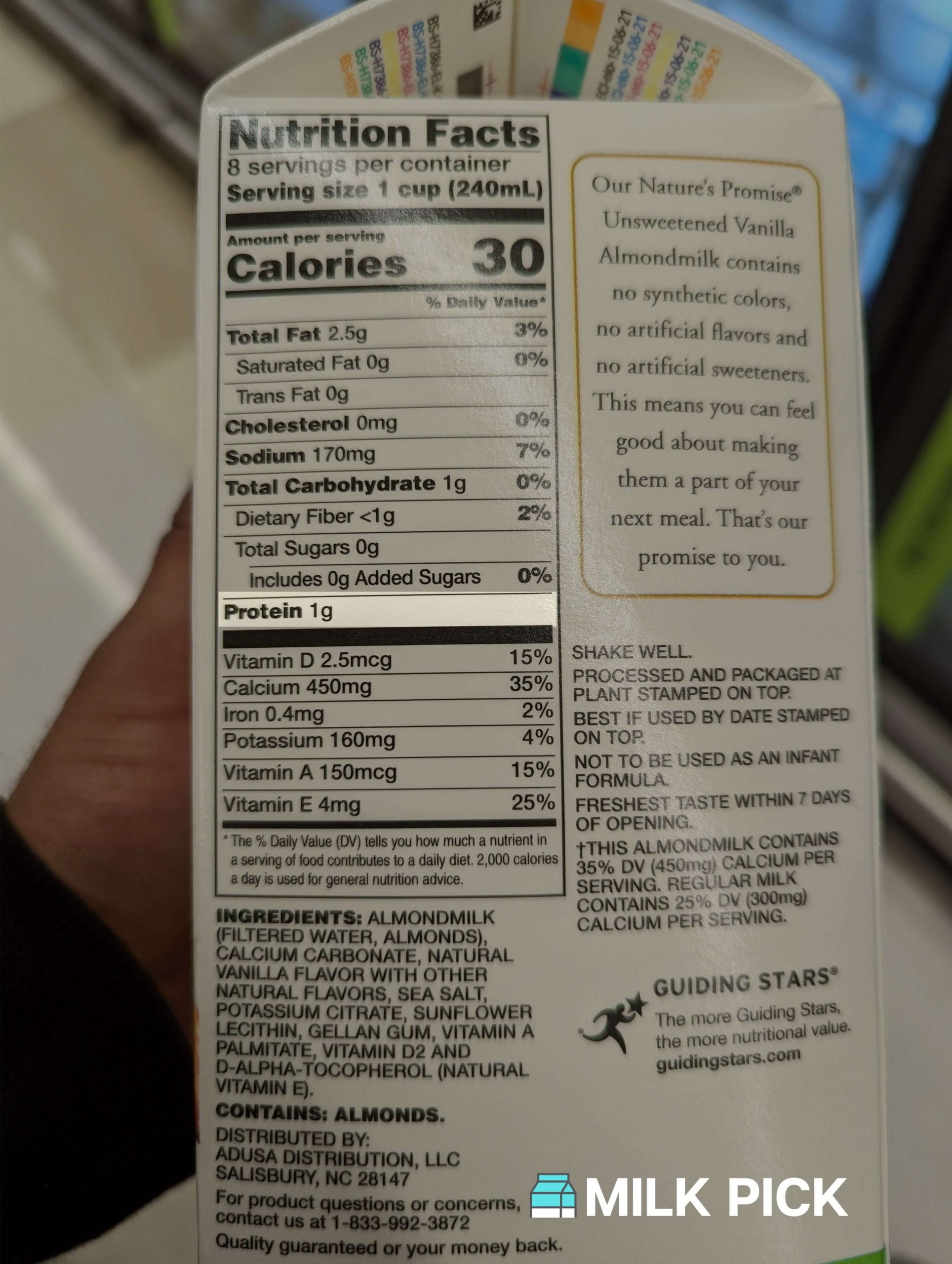
Low Acidity
Almond milk has a neutral pH, which makes it helpful for soothing and calming gastritis symptoms.
Natural almond milk has a pH of about 7, making it slightly alkaline.
This can help neutralize acids in your stomach and digestive system, reducing inflammation associated with gastritis.
However, sweetened almond milk can have a pH as low as 4.5, making it more acidic. This can irritate your stomach lining and make your gastritis symptoms worse.
Always opt for a non-sweetened option to ensure your almond milk has a neutral to alkaline pH to benefit your gastritis symptoms.
Natural Fiber Source
Although almond milk doesn’t contain large amounts of fiber (about 2 grams per serving, depending on the brand), it does serve as a natural source of this important nutrient.
Fiber is beneficial for people with gastritis because it helps move food through the digestive system and keeps your bowels functioning optimally. Combining almond milk with a high-fiber diet can help control gastritis symptoms.
You could also consider adding a high-fiber ingredient, such as psyllium husk, to smoothies or baking recipes made with almond milk.
For example, you can make a dish like psyllium husk pudding with almond milk and adapt the recipe to your specific dietary needs.
Anti-inflammatory
Almond milk contains anti-inflammatory components, such as natural alpha-tocopherol, which can help protect your body against free-radical reactions.
Unlike some dairy products, which can cause inflammation and can irritate your digestive system, natural almond milk reduces inflammation throughout your digestive tract.
Unless you are allergic to nuts or drinking almond milk with several additives, you’ll likely see reduced gastritis symptoms when you switch to organic almond milk.
Possible Problems of Drinking Almond Milk With Gastritis
While natural, additive-free, and organic almond milk brands are good for gastritis, people with the condition should avoid processed, commercialized almond milk products.
These drinks contain artificial flavors, preservatives, and additives like:
- Gellan gum
- Carrageenan
- Soy or sunflower lecithin
These ingredients can irritate your stomach lining and cause increased discomfort.
For example, carrageenan is one of the worst additives for people with gastritis.
Carrageenan is an emulsifier sourced from red seaweed that’s added to some almond milk brands as a binding agent.
Although the FDA approves the additive, carrageenan has been shown to increase bowel irritation, especially in those with digestive conditions.
It can also negatively affect your gut’s microbiome, causing further inflammation and digestive issues.
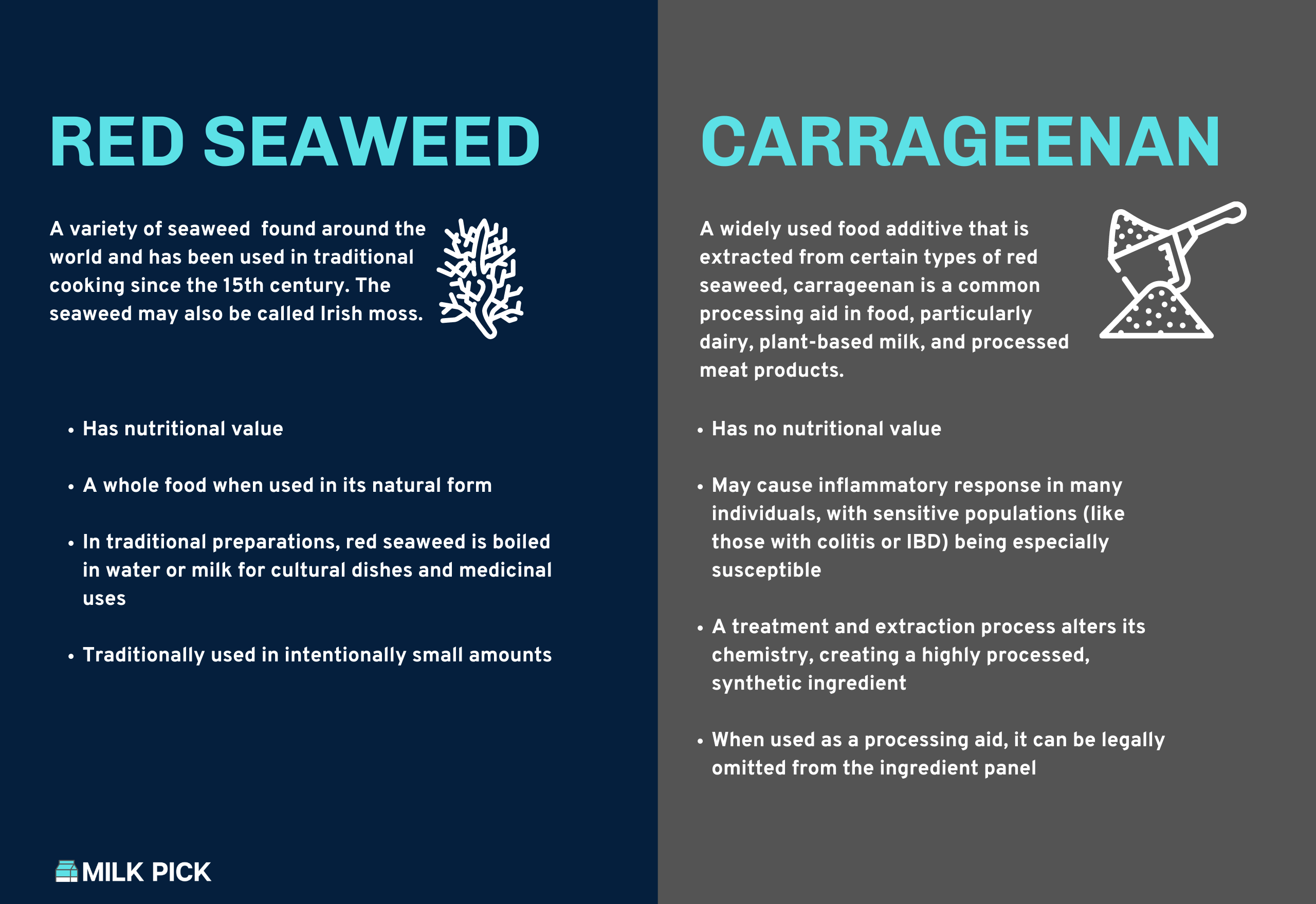
Gellan gum is another common additive in almond milk.
While most studies have shown little evidence that gellan gum is outright harmful, there have been observations that it can slow digestion and cause fecal bulking.
This may not be a noticeable side effect in people without gastritis. However, if you already suffer from irritation and digestive issues, avoiding additives that may add to your symptoms is the best way to prevent discomfort.
Other additives, such as dipotassium phosphate or calcium carbonate, are sometimes added to almond milk to enhance its nutritional properties.
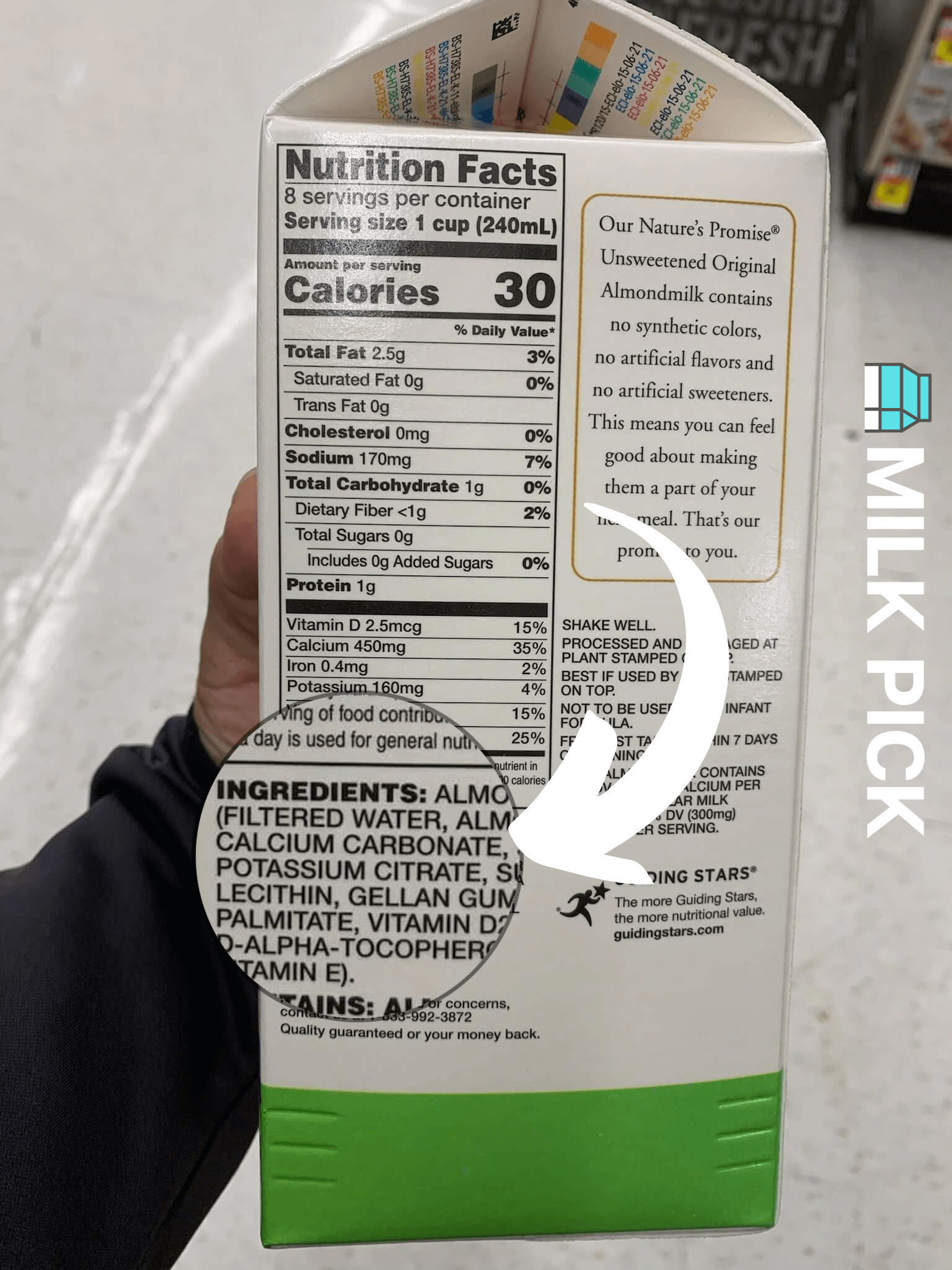
Again, while these additives may not negatively affect those without digestive conditions, they can cause gastritis symptoms to flare up.
You should also look for and avoid additives like Vitamin A palmitate and Vitamin D2 that some almond milk manufacturers put in their products.
These have been shown to irritate the digestive system in some people and can cause gastritis symptoms like bloating, pain, and diarrhea to worsen.
When drinking almond milk with additives, it can be difficult to know which additive is causing distress.
The presence of one additive typically indicates additional ingredients, which increases the chances that you’ll feel some gastritis symptoms after consuming it.
The Best Almond Milk For Gastritis
If you have gastritis, you should choose almond milk that is free of preservatives, additives, and sugars.
An excellent option is to make your own almond milk at home using raw almonds.
Check out our video for a quick and easy recipe: How to Make Almond Milk (Zero Waste!)
You can also use an almond milk base if you want to save time.
For instance, with JOI’s almond milk base, you can make almond milk in around 30 seconds—just blend it with water and you're set. Just keep in mind that homemade almond milk is only good for about 3-5 days, so make sure you drink it fast!
You can also find additive-free almond milk by looking at the ingredient list.
Typically, organic almond milk is the best option because organic brands tend to have fewer ingredients (among other reasons).
Look for the USDA Organic seal on brands like Malk Organics, Three Trees Organic Unsweetened Almond Milk, and New Barn Organics Unsweetened Almond Milk for the best almond milk to help control your gastritis symptoms.
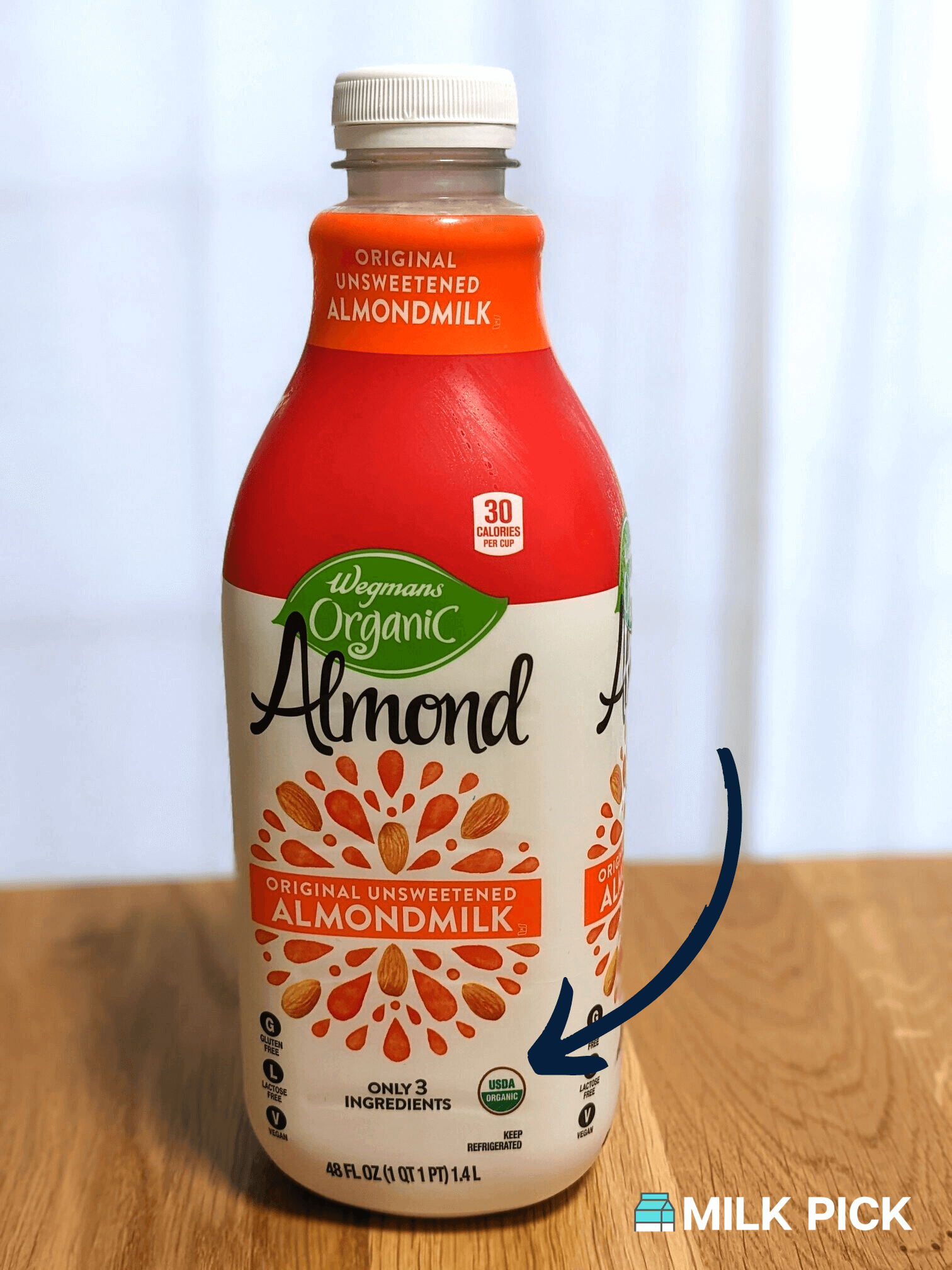
Non-organic brands like Elmhurst 1925 are also a good option, as are those that are Whole30-approved.
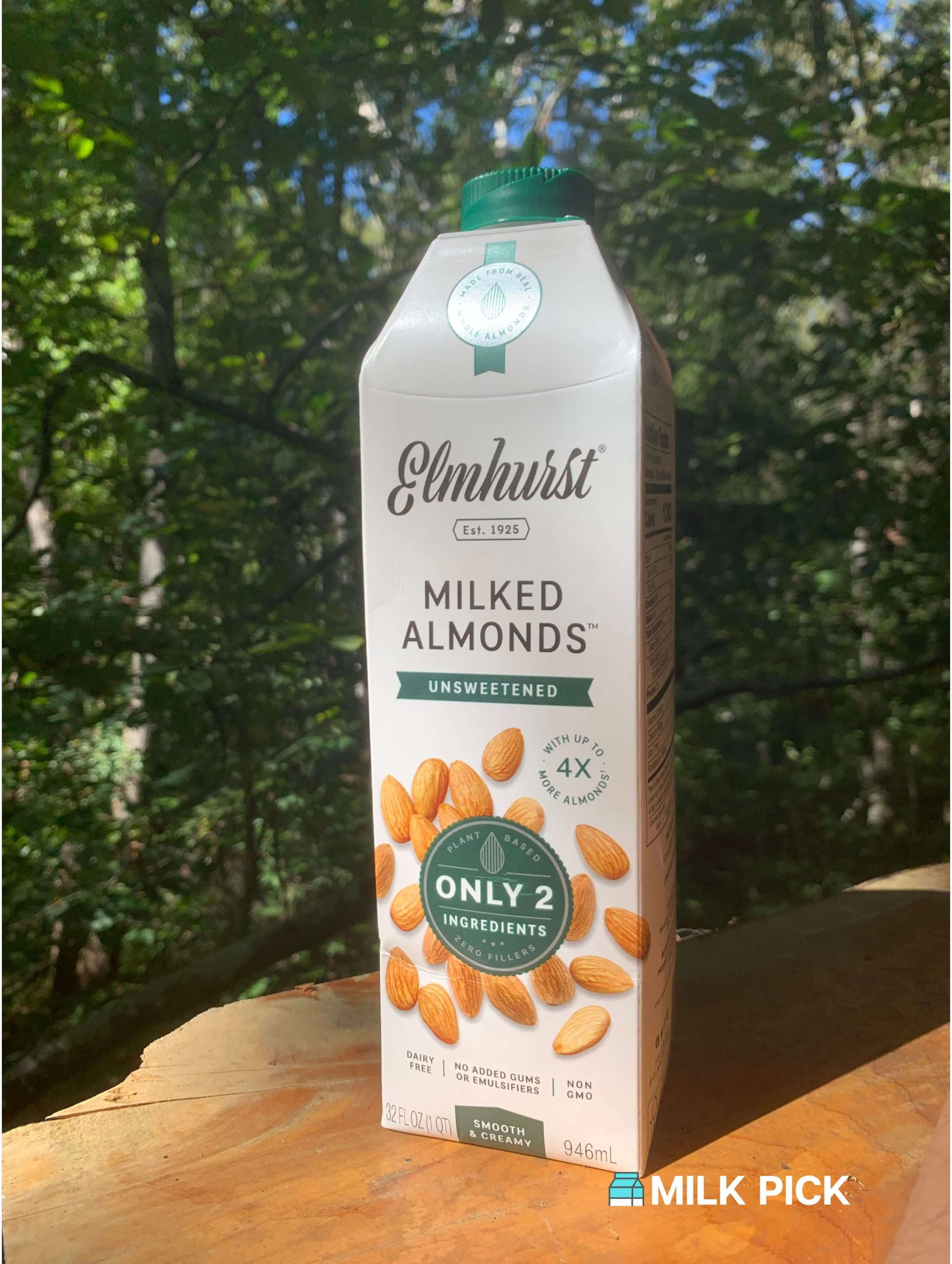
These brands aren’t all certified organic but don’t contain preservatives or additives, so they can still help you with gastritis symptoms.
Work With Your Doctor or Dietitian To Reduce Your Gastritis Symptoms
Ultimately, your body reacts in a biochemically unique way to the foods you eat. What may lessen gastritis symptoms in one person can still cause adverse symptoms in another.
Almond milk is generally an excellent choice for people with gastritis because it’s fairly low in acidity, is low in fat, and supports a plant-based lifestyle - all of which can help reduce pain and inflammation in the stomach lining.
However, you will want to work with your medical provider or dietitian to build an eating plan customized to your needs and determine which kind of almond milk is best for your body.
